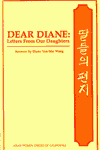 Three volumes in English, Chinese, and Korean editions (1983)
Three volumes in English, Chinese, and Korean editions (1983)
Questions and answers about concerns facing Asian American girls and young women in a “Dear Abby” format.
DEAR DIANE: Letters from our Daughters
A Note to Parents:
During the past two years, we have talked with hundreds of girls and young women about their hopes and dreams and the problems they face. We found that good communication with their parents was very important to them. In 1980-81, a survey was conducted with over 600 immigrant and American-born Chinese, Filipino, Japanese and Korean American female students in San Francisco Bay Area urban and suburban middle schools, high schools, colleges, and universities. One of the goals of this survey was to determine how they feel about themselves, what their aspirations are, and how they perceive their parents and family lives.
We discovered that parents have the strongest influence on Asian American girl students, mothers being more influential than fathers. Other persons important in influencing them include peers, older sisters, and teachers.
We also found that differences in styles of communication within the family have profound effects on the influence parents have on their daughters’ self-image, attitudes, and aspirations. Three patterns of family communication emerged when we asked students how they knew what their parents expected of them. Some girls answered that they knew because they “talked things over” with their parents. We classified this as “two-day communication.” Other girls said they knew because their parents “ordered” or “commanded” them to do things. We called this “one-way communication.” Finally, some girls said they had to guess what their parents wanted. We termed this “indirect communication.”
The survey findings indicate that girls and young women from families where parents and daughters talk things over felt more positive about their lives. They stated more frequently that they were doing well in school and had many friends. Students from families with one-way or indirect communication between parents and children reported more often that they were not doing well in school and that they wished they had more friends. Students from families with one-way communication felt their parents were not supportive and put too much pressure on them about getting good grades, choosing a particular field or job, and getting married. Students from families with indirect communication more frequently felt frightened about the future and said that their parents didn’t care enough about them to put enough pressure on them. Students from families with two-way communication said that their parents put just the right amount of pressure on them.
The survey also revealed that parents in families with two-way communication actually exert greater influence on their daughters than parents who command or don’t communicate. Daughters in families with one-way, authoritarian communication relied almost as much on teachers and counselors as on parents, while daughters in families with indirect communication turned to peers and brothers and sister instead of their parents.
The “Dear Diane” letters in this volume were collected in school and college classrooms, youth groups and clubs, and church groups. The answers were written by former Chinatown Youth Center Executive Director Diane Yen-Mei Wong, who was also formerly Commissioner of the Office of Asian American Affairs in the state of Washington. Diane Wong worked in consultation with youth, counselors, teachers, parents and social workers from the four ethnic groups.
We are presenting these letters to you as an attempt to facilitate better communication and understanding between Asian parents and daughters, particularly in immigrant families, where anguish and confusion often result when cultures and customs collide.
We have placed in the English language materials directly opposite the Chinese (Tagalong, Japanese and Korean) so that the questions and answers can be read together by parents and their daughters.
Of course there are many questions we were unable to include within this slim volume. And we are sure that many of the questions we did include will not be directly relevant to some families. But we hope that there will be something of value here for you, something that will contribute positively to you and your daughter’s love and understanding of each other.
Elaine Kim
Project Director
